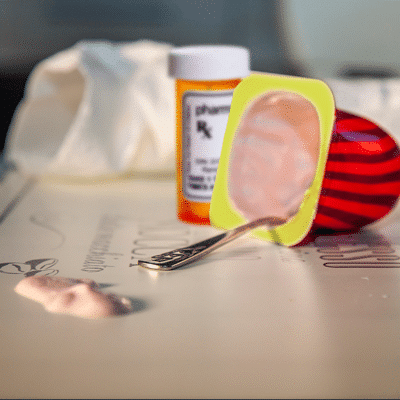Probiotics: Dangers of a “Health” Myth
We’ve all been told to take probiotics whether by a friend, doctor, or tv star promoting it on a commercial.
The influence of media and ads for health products is everywhere.
All products claim to be the best. All products make you think that you need them.
That’s the point of marketing.
But some of these highly pushed products aren’t all that good for your health even if they’re promoted that way.
We’ve written articles on how certain sports supplements can be bad for your health, even though the healthiest looking people suggest them.
The same goes for probiotics.
While there have been studies backing them up, there are also studies coming out on how they might not actually be healthy for everyone to take.
Here we will discuss the potential dangers of taking probiotics and letting you know who tends to be at a higher risk.
What Are Probiotics and Why Do People Take Them?
Probiotics are live strains of bacteria that we ingest.
They are used to add extra bacteria to our gut microbiomes.
Our microbiomes naturally have trillions of bacteria to help break down our foods to make them useful throughout our bodies.
Probiotics are helpful bacteria strains that are added to diversify the healthy bacteria in our guts.
Probiotics naturally occur in some foods that are fermented like:
- Kimchi
- Yogurt
- Kombucha
- Kefir
- Sauerkraut
Western diets typically don’t include any of these naturally fermented foods so we look to supplementation.
Pills and drinkable yogurts make it easier to get your probiotics than fermenting and culturing your own.
The many bacterial families offer different kinds of help to your body.
This is why it’s so important to have a wide range of bacteria types in your gut and usually why doctors suggest taking probiotics.
Some of the main reasons people are told to take probiotics include:
- Increasing bacterial diversity after/while taking antibiotics
- Promoting regular bowel movements
- Reducing diarrhea from Clostridium difficile
These reasons have substantial evidence proving efficiency through medical studies.
Other claims have not been fully backed by medical testing.
Dangers and Potential Side Effects of Probiotics
Just like with medications or anything else you put into your body, probiotics can have damaging effects on your body.
There are more commonly known issues like potential allergies or unfavorable effects on your digestive tract.
However, there are some seriously dangerous issues that can and have become known from the use of probiotics.
Probiotics Have Been Linked to Antibiotic Resistance
This is a huge deal.
While we generally regard antibiotics to be the enemy of our digestive tracts, they do have a necessary place in the medical world.
Antibiotics are needed for serious infections to help your body fight off invaders it isn’t able to on its own.
Overprescribing of antibiotics in recent years has made us more susceptible to antibiotic resistance.
Antibiotic resistance means that they no longer work in your body to fight infections, this is very VERY bad.
Some studies have come out linking probiotic usage to antibiotic resistance.
Probiotics May Have the Potential to Mutate in Your Gut
Since probiotics are living organisms, they have the ability to adapt and change as needed in their environment to survive.
This will vary on a person to person basis. Some of the different habitat issues that are believed to cause probiotic mutations include:
- Previous or current usage of antibiotics
- Diet especially fiber and carbohydrate intake levels
- Current microbial diversity/conditions
- Stress levels
Probiotics Can Inhibit the Effectiveness of Certain Cancer Treatments
This may be one of the most frightening issues of all.
Not only is it frightening but it’s the most backed by science issue with probiotics.
One study found that higher diversity in the gut microbiome created for better results for melanoma patients being treated with anti-PD-1.
Another study found that the use of probiotics actually made for a worse diversity and therefore worse outcomes with treatment.
This study also showed that by creating a better diversity through a high-fiber diet had much better effects than those who used probiotics.
Probiotics Can Increase Chances of Systemic Infections
While these are rare, there have been several cases to be seen in relation to probiotic supplementation.
Some probiotic-related systemic infections include:
- Fungemia
- Bacteremia
- Sepsis
- Endocarditis
Other conditions and procedures have had good success with the use of probiotics, but the conditions listed above should proceed with caution if using probiotic supplements.
Probiotics Can Cause Complications With SIBO and Other GI Conditions
When you have a gastrointestinal issue the first thing you think is to fix the health of your gut.
This makes total sense.
Since probiotics are pictured as the ultimate gateway to good gut health you may be considering using them to fix your gut health.
In some cases, that is a terrible idea.
If you have SIBO, by taking a probiotic you’re adding in more bacteria into the small intestine, where it shouldn’t be.
Thus, you are are adding more fuel to the fire by putting more bacteria in the area where you need to get rid of it.
Also, D-lactic acidosis is a condition where your D-lactate levels rise and you have neurological issues associated with it.
D-lactic acidosis typically affects those who have short bowel syndrome.
Recent studies have shown that brain fog, bloating, and gas are exacerbated in SIBO and D-lactic acidosis patients when they are given probiotics — even if they don’t have short bowel syndrome.
In this case, antibiotics were found to help relieve brain fog, bloating and gas.
Groups That Should Be Especially Careful Before Taking Probiotics
Certain conditions or life stages can increase your risk of being susceptible to problems while taking probiotics.
People who are especially at risk include:
- Elderly
- Infants
- Immune-compromised patients
- Patients that need indwelling IV catheters
- GI tract infections
- Patients requiring immune suppression medications
Although probiotic supplementation can cause issues, using probiotic-rich foods like those listed above can give your body tons of benefits.
Make sure to talk to your doctor before taking any supplements or increasing any particular foods to make sure it’s safe for you to do.
It’s always better to be safe than sorry.
As always, keep a healthy diet, do light exercise several times a week, and drink lots of water.
These basic tips can be the difference you need for a healthier and happier life.




Hello,
Would Atrantil cause some die off symptoms after several months? I did not have the die off symptoms until now.
I’ve been taking Atrantil for several months now – 6 per day, 2 at each meal. I have also taken Xyfaxin for SIBO. It has helped all my symptoms except my appetite, which continues to be poor. I have had the problem for 20 plus years. Maybe it just takes longer for Atrantil to cure the SIBO? Thanks so much.
Hi Katherine,
Thank you for contacting us. Usually die off happens fairly quickly after starting Atrantil. It should not happen after months of taking Atrantil. We recommend stopping Atrantil and seeing a health care professional if symptoms persist or worsen to see if you may have someting else going on.
Best wishes,
Support Team
I am seeing good results at about 10 days in at 6 tablets a day (2 tabs 3X per day). But I am just starting to see it…how much long do you suggest I keep taking the same dosage? Another 2 weeks?
Hi Ami,
We are so happy you are seeing good results with Atrantil! We recommend sticking to 2 capsules 3 times pre day until you have had relief from your symptoms. Once you have had relief, we recommend reducing to the maintainence dose of 2-3 capsules every morning. We hope this helps to clarify.
Best wishes,
Support Team